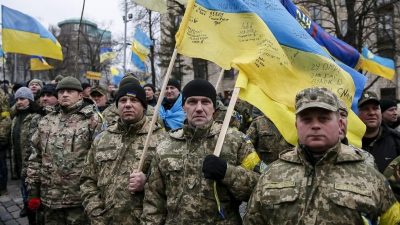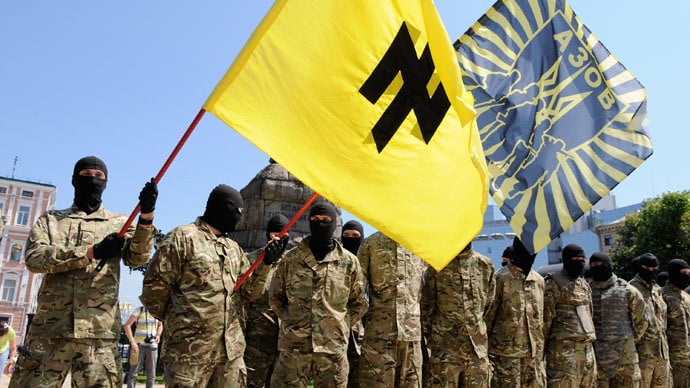NATO’s Fascist Wedge in Ukraine

The latest advert for Ukraine’s armed forces depicts chiselled military hunks over a caption: “THEY WILL PROTECT YOUR INVESTMENTS — Ukrainian Army: protecting the borders of civilisation.”
In reality, Russia was Ukraine’s largest single investor in the first six months of 2018, comprising 34.6 per cent of total foreign direct investment.
Advertising slogans for Ukraine’s army targeted at English-speaking investors are a sign of increasing desperation within ruling circles.
Recent public reports of the mafia running Odessa, Ukraine’s largest port, were linked via the Paradise Papers in a BBC investigation to money laundering in London’s property market by Alexander “The Don” Angert and his enforcer Hennady Trukhanov, currently Odessa’s mayor.
Ukraine’s real economy meanwhile is flatlining. GDP collapsed from $183 billion (£139bn) per annum in 2013 to $93bn (£70bn) last year.
The average Ukrainian wage today is €190 (£170) per month. In May rail workers shut down production at Ukraine’s largest steel mill in wage protests against owners ArcelorMittal.
Daily shelling of urban areas and civilian infrastructure by Ukraine’s army and their allied fascist paramilitary formations affects 60 per cent of the population of the Donbass living along the heavily mined 457km contact line with the breakaway Donetsk and Luhansk People’s Republics.
Food insecurity has doubled in Ukraine since 2016, now affecting 1.2 million people, alongside escalating cases of multidrug-resistant TB, HIV and even polio.

Ukraine’s Right Sector rally in Kiev in 2015 (Source: author)
According to the UN refugee agency, Ukraine currently has 1.8 million internally displaced persons and the World Health Organisation records 4.4 million affected by the war in the east, of whom 3.4 million require humanitarian assistance and protection. Over 10,000 have died.
In this human catastrophe, it is remarkable that the British government’s gift of another £35 million in aid to Ukraine’s military announced in June 2018 receives so little media attention.
Britain’s latest donation is in addition to £850,000 of “non-lethal” military equipment announced by then Tory defence secretary Michael Fallon in March 2015.
Around 100 British military trainers were deployed to run 30 courses for infantry, medical and logistics corps across 14 military sites in the Ukraine.
Britain also installed a “senior adviser” inside Ukraine’s defence ministry, no doubt, given Ukraine’s epically corrupt politics, to ensure British largesse is greasing the right palms.
British military funding of Ukraine, however, is dwarfed by that of Canada and the United States.
In April this year the US supplied Javelin anti-tank missiles to Ukraine and in May 2018 the US Congress approved $250m of military funding, specifically including deliveries of lethal weaponry.
Just two weeks ago on September 1, President Donald Trump’s special envoy to Ukraine Kurt Volker (a neocon, acolyte of senator John McCain, previously appointed by George Bush as US ambassador to Nato) announced further US arms supplies would follow, boasting of rising anti-Russian sentiment in Ukraine.
One day earlier, a terrorist bomb in a central Donetsk cafe killed Alexander Zakharchenko, leader of the Donetsk People’s Republic.
Ukraine is where the new cold war has tipped into a hot war.
However, Ukraine’s endemic corruption, state instability and poor-quality armed forces have proved to be constraints on Nato ambitions.
These constraints have reinforced a reliance on far-right militias, with links to organised crime and neonazi, white supremacist groups.
Socialists have long warned against the dangers of Western states nurturing far-right Ukrainian political forces.
In June 2018, Labour MSP Neil Findlay criticised a visit to the Scottish Parliament by Andriy Parubiy, a founder of the neonazi Social-National Party of Ukraine (SNPU), saying:
“I would prefer to know the next time I am asked to welcome a racist, fascist nazi to this parliament.”
Predictably, the Labour MSP was accused of having “tallied perfectly with Kremlin messaging.”
More recently, however, “Bellingcat” (an “open source, social media investigation” website with a pronounced pro-Nato reputation) has warned about Western financial, military and political support for Ukrainian neonazis.
This suggests that Nato countries’ increasing reliance on openly neonazi paramilitaries to maintain the current pro-Western regime in power in Ukraine is causing serious concerns.
On August 30, Bellingcat published a report (“Ukrainian Far-Right Fighters, White Supremacists Trained by Major European Security Firm”) by Oleksiy Kuzmenko, detailing the “sophisticated training geared towards combat application” delivered since 2016 by the European Security Academy (ESA) to Ukraine’s neonazi Azov Battalion, now part of Ukraine’s National Guard.
Californian Congressman Ro Khanna, a strong critic of Azov, claimed in May 2018 that the “battalion has very much engaged in incidents of neonazism.”
Khanna characterizes Azov as a “neonazi battalion” and promoted the 2018 US Congressional ban on the use of US budget funds “to provide arms, training, or other assistance to the Azov Battalion.”
Based in Wroclaw, Poland, ESA is Europe’s largest private military training agency. Serving British soldiers are sent there on specialist training and security courses paid for by the British government as part of “resettlement programmes” to prepare them for the world of private security contractors in civvy street.
Azov Battalion veterans and activists in Azov’s political party, The National Corps, received special-ops training at ESA’s training centre in Poland along with activists of other far-right organisations in Ukraine linked to attacks on Roma, LGBT persons and civil rights activists.
Members of Azov’s aggressively expanding street force, the National Militia, which attacks minorities in Ukraine and seeks to mirror law-enforcement to enforce “Ukrainian order,” also received ESA training.
Yet another, Tradition and Order, “an aggressively expanding violent ultra-nationalist organisation,” at least one of whose leaders is a self-admitted “national-socialist” with a penchant for nazi salutes, also attended an ESA course in Poland.
Politicians like Neil Findlay have shown that it is possible to stand up against the normalisation of the far right in Ukrainian politics.
It is now essential that the Westminster government is held to account for its funding and training of far-right, Ukrainian paramilitaries.
*
Note to readers: please click the share buttons above. Forward this article to your email lists. Crosspost on your blog site, internet forums. etc.
Featured image is from Crisis Group.


